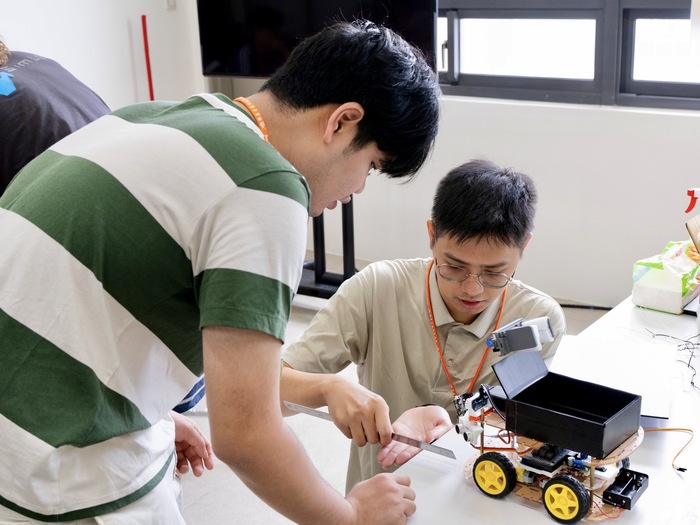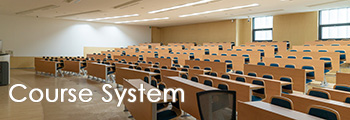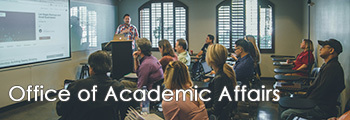International Collaboration at Taipei Tech: Students Compete in PBL Workshop

Taipei Tech recently hosted the 11th International Problem-Based Learning (PBL) Competition Workshop, attracting 66 outstanding students from 12 partner universities in Japan, the United States, Vietnam, Thailand, Poland, and other countries. For eight days, together with 12 Taipei Tech students, they worked closely in teams to design and build smart autonomous vehicles. This project aimed to enhance the students’ skills in software-hardware integration, problem-solving, and international collaboration.
Vice President Thomas C.K. Yang warmly welcomed the international participants, highlighting the first-time participation of Poland’s Gdańsk University of Technology. Other newcomers included the New Jersey Institute of Technology, University of Cincinnati, Arizona State University, University of Washington, Kyushu University from Japan, and Hanoi University of Science and Technology from Vietnam. Institutions returning for a consecutive year included the University of California, Riverside, Thammasat University (Thailand), Ho Chi Minh City University of Technology (Vietnam), Osaka Institute of Technology, and Kyushu Institute of Technology (Japan).
Students were divided into nine teams to create autonomous vehicles featuring automatic navigation, precise color recognition, positioning, and object pickup. Using Arduino kits and 3D modeling and printing techniques, teams tackled programming, hardware integration, time management, data analysis, and strategic planning challenges. The goal was to finalize prototypes during the workshop and achieve the highest scores in the competition.
Mouli Suri from the University of Cincinnati expressed excitement about meeting new people and learning new skills, particularly working with Arduino. Huang You-sian, a student from the Department of Mechanical Engineering at Taipei Tech, participated for the second time and noticed a boost in enthusiasm with more participants from Europe and the US. He encouraged students to join, saying this is a great opportunity for cultural exchange and professional collaboration.
Taipei Tech and Osaka Institute of Technology have collaborated on this event since 2013. Dean Toshimitsu Morizane said this year’s challenge emphasized practicality, urging participants to showcase their best skills. After witnessing the event’s growth over 11 years, Professor Zhou Hong, also from Osaka Institute of Technology, praised the teams for overcoming significant challenges and delivering outstanding performances.
Thammasat University from Thailand sent seven students. Team leader Hsu Shu-han indicated that the Thai students noted collaborating with peers from different countries was an invaluable experience that enhanced their project design and teamwork skills. Chuang Ho-chiao, Dean of Research and Development at Taipei Tech, thanked students for their dedication, highlighting that many worked tirelessly, even sleeping in classrooms. He emphasized the importance of the international friendships formed during the event.
At the closing ceremony, Taipei Tech Vice President Jen Yi-jun thanked international students and encouraged them to share their experiences to inspire more participation in the future. Tohru Kamiya, Executive Vice President of the International Operations Headquarters at Kyushu Institute of Technology, thanked Taipei Tech for hosting and invited partner schools to Japan for next year’s workshop, expressing confidence that the experience will bring students unforgettable memories and valuable friendships.
Vice President Thomas C.K. Yang warmly welcomed the international participants, highlighting the first-time participation of Poland’s Gdańsk University of Technology. Other newcomers included the New Jersey Institute of Technology, University of Cincinnati, Arizona State University, University of Washington, Kyushu University from Japan, and Hanoi University of Science and Technology from Vietnam. Institutions returning for a consecutive year included the University of California, Riverside, Thammasat University (Thailand), Ho Chi Minh City University of Technology (Vietnam), Osaka Institute of Technology, and Kyushu Institute of Technology (Japan).
Students were divided into nine teams to create autonomous vehicles featuring automatic navigation, precise color recognition, positioning, and object pickup. Using Arduino kits and 3D modeling and printing techniques, teams tackled programming, hardware integration, time management, data analysis, and strategic planning challenges. The goal was to finalize prototypes during the workshop and achieve the highest scores in the competition.
Mouli Suri from the University of Cincinnati expressed excitement about meeting new people and learning new skills, particularly working with Arduino. Huang You-sian, a student from the Department of Mechanical Engineering at Taipei Tech, participated for the second time and noticed a boost in enthusiasm with more participants from Europe and the US. He encouraged students to join, saying this is a great opportunity for cultural exchange and professional collaboration.
Taipei Tech and Osaka Institute of Technology have collaborated on this event since 2013. Dean Toshimitsu Morizane said this year’s challenge emphasized practicality, urging participants to showcase their best skills. After witnessing the event’s growth over 11 years, Professor Zhou Hong, also from Osaka Institute of Technology, praised the teams for overcoming significant challenges and delivering outstanding performances.
Thammasat University from Thailand sent seven students. Team leader Hsu Shu-han indicated that the Thai students noted collaborating with peers from different countries was an invaluable experience that enhanced their project design and teamwork skills. Chuang Ho-chiao, Dean of Research and Development at Taipei Tech, thanked students for their dedication, highlighting that many worked tirelessly, even sleeping in classrooms. He emphasized the importance of the international friendships formed during the event.
At the closing ceremony, Taipei Tech Vice President Jen Yi-jun thanked international students and encouraged them to share their experiences to inspire more participation in the future. Tohru Kamiya, Executive Vice President of the International Operations Headquarters at Kyushu Institute of Technology, thanked Taipei Tech for hosting and invited partner schools to Japan for next year’s workshop, expressing confidence that the experience will bring students unforgettable memories and valuable friendships.






